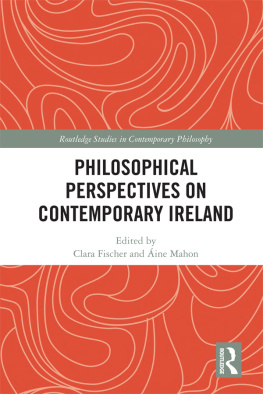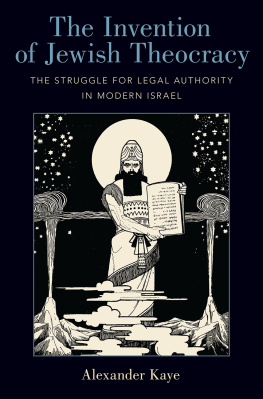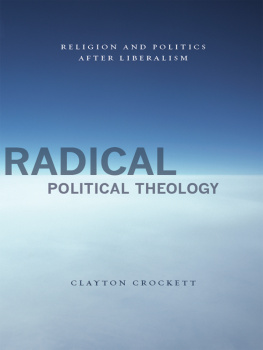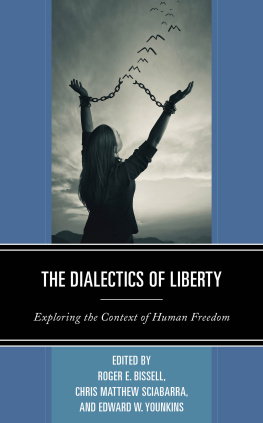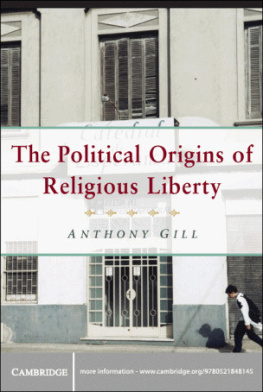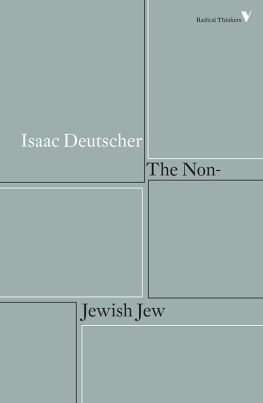On Liberty
CURZON JEWISH PHILOSOPHY SERIES
Series Editor: Oliver Leaman
It is the aim of this series to publish books in the general area of Jewish philosophy. A broad interpretation will be taken of what Jewish philosophy comprises, and the series will be interested in receiving proposals which involve a philosophical treatment of a Jewish thinker or topic, or which look at some aspect of Jewish cultural life from a philosophical perspective.
MEDIEVAL JEWISH PHILOSOPHY
An Introduction
Dan Cohn-Sherbok
FACING THE OTHER
The Ethics of Emmanuel Levinas
Edited by Sen Hand
MOSES MAIMONIDES
Oliver Leaman
A USERS GUIDE TO FRANZ ROSENZWEIGS
STAR OF REDEMPTION
Norbert M. Samuelson
ON LIBERTY
Jewish Philosophical Perspectives
Edited by Daniel H. Frank
On Liberty
Jewish Philosophical Perspectives
Edited by
Daniel H. Frank
First published 1999 by Curzon Press
2 Park Square, Milton Park, Abingdon, Oxfordshire OX14 4RN
52 Vanderbilt Avenue, New York, NY 10017
Routledge is an imprint of the Taylor & Francis Group, an informa business
First issued in paperback 2019
Copyright 1999 Daniel H. Frank
All rights reserved. No part of this book may be reprinted or reproduced or utilised in any form or by any electronic, mechanical, or other means, now known or hereafter invented, including photocopying and recording, or in any information storage or retrieval system, without permission in writing from the publishers.
Notice:
Product or corporate names may be trademarks or registered trademarks, and are used only for identification and explanation without intent to infringe.
British Library Cataloguing in Publication Data
A catalogue record of this book is available from the British Library
Library of Congress Cataloguing in Publication Data
A catalog record for this book has been requested
Typeset in New Century Schoolbook by
LaserScript Ltd, Mitcham, Surrey
ISBN 13: 978-0-7007-1144-4 (hbk)
ISBN 13: 978-0-415-59255-0 (pbk)
Dedicated to the Memory of
Madeleine Goodman and Zeev Falk
Colleagues
Scholars
Friends
Contents
Lenn E. Goodman
Edward Halper
Jonathan Jacobs
Daniel H. Frank
Zeev W. Falk
Daniel Statman
Oliver Leaman
Aryeh Botwinick
Peter J. Haas
Aryeh Botwinick is Professor of Political Science at Temple University, USA
Zeev W. Falk was Rector and Professor of Jewish Law at the Seminary of Judaic Studies (Jerusalem) and Berman Professor of Law at the Hebrew University of Jerusalem, Israel
Daniel H. Frank is Professor of Philosophy and Director of the Judaic Studies Program at the University of Kentucky, USA
Lenn E. Goodman is Professor of Philosophy at Vanderbilt University, USA
Peter J. Haas is Associate Professor of Jewish Thought and Literature at Vanderbilt University, USA
Edward Halper is Professor of Philosophy at the University of Georgia, USA
Jonathan Jacobs is Associate Professor of Philosophy at Colgate University, USA
Oliver Leaman is Professor of Philosophy at Liverpool John Moores University, UK
Daniel Statman is Associate Professor of Philosophy at Bar-Ilan University, Israel
W ith its theocentric focus and emphasis on communal law and regulation, Judaism and traditional Jewish thought would seem to ill consort with the modern (post-Lockean), liberal political sensibility and its focus upon rights, personal autonomy, and a studied values neutrality with respect to the human good. From this angle the central issue of this collection devoted to political liberty appears to be the commensurability (or incommensurability) of tradition and modernity. And in a general way, this is the problematic here. But the reader will be in for a surprise I think, for the starting point, the very presumption of the debate is here reversed. Invariably it is presumed that it is tradition (or religion), in this case Judaism, that must play catch-up. It is Judaism that must reform itself in some fashion, so as to take full part in modern life and the liberal state. There is no thought that it is the liberal state, indeed modernity itself and what it stands for, that is lagging behind and in need of reform. But it is just this possibility that many of the chapters in this volume, especially in the first part, address.
This volume in its own way joins company with the chorus of those urging a revisioning of liberalism, at least in the form championed by Locke and Mill. A number of the chapters (Goodman, Halper, Jacobs) display the kind of discomfort that contemporary communitarian critics of liberalism (Sandel, MacIntyre, Taylor, Walzer) have felt with both the premises and the political agenda of modern liberalism, its atomistic (asocial) view of the individual, its values neutrality with respect to the human good, and its commitment to a very wide values pluralism to underwrite its neutral stand. This communitarian response to liberalism, evocative of much pre-modern, classical political thought and its molecular view of the individual and thick conception of the good, places traditional religion in general and Judaism in particular in a very powerful position to lead the discussion concerning the reconceptualization of the modern political sensibility. Whether religion and its norms and values should play this role is of course another question. Goodman, Halper, and Jacobs, each in his own way, certainly think so, and they argue for a (liberal) agenda not at odds with a strong normative stand, indeed prescriptive of those extrapolitical values that Judaism entails. For them, the philosophically interesting problem becomes that of finding common ground between Judaism and the liberal state that goes beyond mere accommodation.
But classical liberalism is not dead and the last three chapters in the first part (Frank, Falk, Statman) provide differing responses to the communitarian critique. As noted, the unspoken presumption underlying the debate between tradition and modernity, between religion and the liberal state, has been that it is tradition and religion that must be modernized (and depoliticized), rather than that modernity and the liberal state be infused with extra-political, religious norms. This regnant assumption, created out of the crucible of post-Reformation religious intolerance, demanded of religion(s) a time-out period, a time of restraint, at least until a set of extra-religious norms could be fixed. Some sort of separation of church and state followed in all liberal democracies. This legacy, often written into law, continues in the (classical) liberal agenda with its manifest lack of enthusiasm on the political level to impose or prescribe any particular set of values, save those of a (negative) noninterventionist sort catering to the pluralism and the commitment to personal autonomy undergirding the modernist program. While such non-interventionism is anathema to the communitarian prescriptivist, the non-communitarian liberal, ever mindful of the (not so distant) past, rests content with the strict separation of church and state and the correlative privatization of religion. For the liberal, religion is still the culprit with its imperialistic tendencies, and for the liberal living as a Jew in an overwhelmingly Christian country such as the United States, the strict separation of church and state makes perfect sense.


